#Literary Ethics
Quote
Explore, and explore, and explore. Be neither chided nor flattered out of your position of perpetual inquiry. Neither dogmatise yourself, nor accept another's dogmatism.
Ralph Waldo Emerson, Literary Ethics
#philosophy#quotes#Ralph Waldo Emerson#Literary Ethics#exploration#inquiry#attention#awareness#ethics
264 notes
·
View notes
Text
i am at any given point this 🤏 close to waxing poetic about the jedi code
#personal#i think about their philosophies and start chewing on walls <3#where was this energy in college i ask of you#me when being forced to contemplate the themes and motifs of extremely lauded literary classics: eugh#me when nobody is asking me to talk about fictional space samurai wizards and their code of ethics/conduct/religion that was never#actually really codified in the movies they come from and most of the information we have on them comes from ancillary content that was#never given the Canon Stamp Of Approval but have been so widely accepted by the audience/writers of that ancillary content that they might#as well be: IN THIS ESSAY I WILL—
62 notes
·
View notes
Text
the one thing that gege has served us well with is knowing that they’re very aware of how old these kids are
their actions and thoughts can be mature, sure, given their circumstances, but they’re still kids. in every other way.
yuuji is naively optimistic about his delicate situation. never fully understanding what exactly he was up against. he had no perspective or even a clue to what dying by his rash decision (to eat sukuna’s finger) meant in the slightest, because he’s just a kid.
he took it in stride and that’s what kids do — “okay, what now?”
asking questions, overly excited about menial things, overprotective, rash towards anything that threatens his friends, pouty, a need to find his purpose, feeling responsible for everything… the list goes on and on, but these things all describe yuuji in the sense that they also describe a teen.
gege is so deliberate with rehashing this point so thoroughly, without fail, and without making it overly obvious.
take how they made yuuji react to his first near-death experience with the cursed womb in season one, for example. beforehand, he was confidently and calmly assuring gojo he was prepared to die when his time came. and he was.
he thought he was.
but as soon as he at death’s door, ready to step inside, he started to chicken out. yuuji felt scared, because he was too young to realize he wasn’t ready to accept his own mortality. and, like a kid, he rejected it as soon as he was forced to come to terms with it.
sukuna was there to inadvertently “help” yuuji keep on going with his running up to death’s doorstep, ding-dong-ditching it, and getting away with it each time. yuuji was learning to be scared of death — of both himself and others near and dear to him — and sukuna was accidentally lending him his hand by using his reversed curse technique.
what’s more, is nanami’s own hand in it all. he’s the first one to directly point out; “you’re just a child. let an adult handle this.”
it wasn’t meant to be mean nor cruel, but rather just a factual statement — yuuji is a child, and shouldn’t be treated as anything more. nanami took preserving yuuji’s young, impressionable mind to heart. by god, did he follow through, too.
gojo also played his part, as well. his spiel was protecting one’s youth: “no one’s youth should ever be stripped from them.”
whether from nanami or gojo, gege uses their motives of protecting yuuji to showcase and remind their audience of just how young our main character is; of how spoiling someone’s innocence can just about be the worst crime someone can commit.
#geges literary techniques and their way of expressing their ideas#is so fundamental to understanding each character’s ideology#as well as their ethics#some of them state it directly at some point#but others like yuuji or megumi are a bit more convoluted#because they don’t even know what they want#i could be wrong tho? i haven’t caught up w the newest manga leaks#(or i could’ve missed it altogether)#jjk#jujutsu kaisen#itadori yuuji#yuuji itadori#jjk itadori#satosugu#gojo satoru#geto suguru#gojo#geto
66 notes
·
View notes
Text
having spoilery thoughts about The Archive Undying in the context of that post that someday the queer couple that says "let's fuck it all and run away together!" should actually do it:
Sunai and Veyadi don't actually run away but I do think that's what emotionally/ethically happened in the last quarter or so of the book?
Sunai's initial motivation was to prevent the totalitarian state from getting to keep an enforcer mecha to oppress his home city. Made perfect sense. Despite the emotional upheavals and betrayals and murders, that kept being true pretty much up until the Maw eats him. We learn that the Passenger trying to help him do this is the same entity that has caused Corruption aka the deaths of AIs who became tyrants.
And there's a whole ethical quandary there bc the AIs who died were tyrants and Iterate Fractal ate people and there should be some force that can stop even gods. But also the Passenger killed these AI in ways that led to the deaths of millions of people and left their corpses as weapons that could be used by the Harbor and left their remnants as hungry scavengers who kill people.
And so as various characters align with/against the Passenger I am just lost on how I should feel. It's cause is noble in abstract! It's methods cause great suffering! It's unclear why the Passenger cares about killing the Maw at this point given that it is no longer controlling a large group of people. Perhaps it is just that Sunai asks and Veyadi asks and Ruhi asks and the Passenger always answers when people ask because that is it's purpose.
And then Sunai is one with the Maw, who is a remnant of Iterate Fractal and that larger plot goes out the window. His friends want to separate them or mercy kill him or kill the Maw with him as collateral damage. He can't be separated from the Maw, who had always wanted him as their conscience and thus horribly abused him his whole life. Veyadi, on realizing that they can't be separated decides he wants to protect Sunai more than he wants to kill the Maw. They fight the Passenger and Ruhi, who remains laser fixated on the larger cause.
And that's the point where the pair of them decide to leave and they leave. Sure, the Passenger might be the only force capable of protecting humans from tyrant AIs. But they no longer care about that compared to the fight to live and get to be together. They imprison it and Ruhi (and, if I understand correctly, entomb Ruhi alive in eternal torment??) to prevent it from ever trying to kill them again. They survive together. The End.
And, well. The gays sure did run away from their problems together for once! but boy howdy was I unsure of how to feel about that final arc.
#the archive undying#not saying all that in a hater way it really did make you think!#but I deeply want to pick over this book with someone#anybody want to muddle through 470 pages of extremely confusing worldbuilding betrayals and ethics?#i need a second brain to figure out my feelings on this one#it took me almost the entire book to figure out The Cradle was the moon i am not good enough at literary analysis for this one#long post#books#the archive undying spoilers#mine
15 notes
·
View notes
Text
revoking people’s right to talk about the tolstoy marriage until they write and turn in to me a ten page essay on complex relationships
#‘tolstoy STOLE from sophia’s diary’ almost certainly not true.#at least not in the usual vein - sophia was (and should be credited as!) at the very least his editor and collaborator#with w&p at times i want to say co author but i also dont think we should diminish the importance of editing#they worked as a team! and in the later years when thier relationship was increasingly frought they were BOTH reading each others diaries.#the problem is there is genuinely an avenue to talk about how tolstoy drew from real life in less than ethical ways#tanya bhers/natasha rostova for instance. THE KREUTZER SONATA! FOR INSTANCE!#but diminishing it down to oh he stole from her is. a disservice to both of them.#sophia confessed her love by writing a story that blatantly copied real life and lev’s personal insecurities confessed in confidence#and honestly that isnt even BAD like there is a reason they were happily married for 25 years! they’re work is similar they were a team!#we dint need to flatten it out to sophia-wife-victim lev-husband-abuser.#nor do we need to ignore the many ways sophia suffered!#it’s just theyve been reduced to a famous literary disaster marriage when they really… werent that.#gabby.txt#genuinely tanya as the inspiration for natasha is far more upsetting to me than giving his diary to sophia before the wedding.#idk. idk! its like on one hand im so fully on sophia's side and im so happy that her diaries and writing are being translated#and. not even on the other hand these ideas arent in opposition to each other. reducing her marriage to a flat picture of suffering is. bad#actually i think in many ways the problem is solved by looking at sophia as an author instead of a wife.#which like. she was very much both. but if we afford her the agency afforded to an author i think the conversation immediately gains nuance#and that also comes with the caveat of female authors being far less respected - look at nadezhda khvoshchinskaya - but still#anyway GOOOOD morning
23 notes
·
View notes
Text
Embracing Nietzschean Philosophy: Exploring "Thus Spake Zarathustra"

Friedrich Nietzsche's "Thus Spake Zarathustra: A Book for All and None" is a profound and provocative work that challenges conventional beliefs and invites readers to reexamine their values and assumptions about life, morality, and the human condition. Originally published in 1883, this philosophical masterpiece explores themes such as the death of God, the eternal recurrence, the will to power, and the Ubermensch (or "overman"), presenting Nietzsche's vision of a new way of thinking and living in the modern world.
At the heart of "Thus Spake Zarathustra" is the character of Zarathustra, a fictionalized version of the ancient Persian prophet Zoroaster, who descends from his mountain retreat to share his wisdom with humanity. Through a series of discourses, parables, and aphorisms, Zarathustra challenges his listeners to transcend their limitations, embrace their innermost desires, and strive for self-mastery and self-overcoming. Nietzsche's use of allegory and metaphor imbues the text with richness and depth, inviting readers to engage with its philosophical themes on multiple levels.
One of the most striking features of "Thus Spake Zarathustra" is its lyrical and poetic style, which sets it apart from Nietzsche's more academic works. Translated by Thomas Common, the text retains much of its original beauty and power, capturing Nietzsche's philosophical insights with clarity and elegance. Common's translation allows readers to immerse themselves in Nietzsche's thought-provoking ideas and experience the full force of his rhetorical flourishes and linguistic innovations.
Moreover, "Thus Spake Zarathustra" is notable for its critique of traditional morality and religion, which Nietzsche argues have stifled human potential and constrained individual freedom. Through Zarathustra's teachings, Nietzsche advocates for a radical revaluation of all values, urging readers to embrace a more expansive and life-affirming ethos that celebrates creativity, authenticity, and self-expression. Nietzsche's rejection of conventional norms and his embrace of existential freedom continue to resonate with readers today, inspiring countless individuals to question authority and forge their own path in life.
In addition to its philosophical depth and literary merit, "Thus Spake Zarathustra" has had a profound impact on art, literature, and culture, influencing thinkers such as Sigmund Freud, Carl Jung, and Friedrich Engels, as well as artists, musicians, and writers from around the world. Its themes of self-discovery, self-transcendence, and the pursuit of meaning continue to inspire and challenge readers to this day, making "Thus Spake Zarathustra" a timeless classic that speaks to the eternal quest for wisdom and self-realization.
In conclusion, "Thus Spake Zarathustra: A Book for All and None" by Friedrich Nietzsche, translated by Thomas Common, is a thought-provoking and intellectually stimulating work that continues to captivate readers with its profound insights, poetic language, and revolutionary ideas. Nietzsche's vision of the Ubermensch and his call to embrace the fullness of life remain as relevant today as they were when the book was first published, offering a powerful antidote to the nihilism and despair of the modern age.
Friedrich Nietzsche's "Thus Spake Zarathustra: A Book for All and None" is available in Amazon in paperback 23.99$ and hardcover 29.99$ editions.
Number of pages: 471
Language: English
Rating: 11/10
Link of the book!
Review By: King's Cat
#Thus Spake Zarathustra#Friedrich Nietzsche#Philosophy#Existentialism#Ubermensch#Overman#Will to power#Nihilism#Death of God#Eternal recurrence#Morality#Individualism#Self-overcoming#Self-mastery#Transcendence#Human condition#Spiritual liberation#Life affirmation#Existential freedom#Philosophy of life#Ethics#Individual autonomy#Nietzschean philosophy#Self-discovery#Self-realization#Human potential#Radical revaluation#Authenticity#Self-expression#Literary classic
2 notes
·
View notes
Text
Delving into Poetic Wisdom: A Review of "On the Art of Poetry" by Aristotle
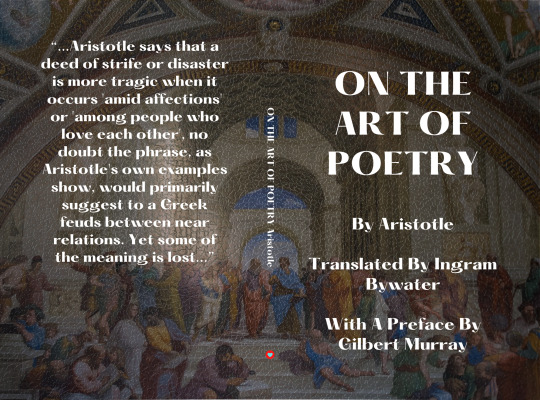
Aristotle's "On the Art of Poetry," translated by Ingram Bywater, stands as a seminal work in literary criticism, offering profound insights into the nature and function of poetry that continue to resonate with readers and scholars alike. Written in the 4th century BCE, this treatise serves as a comprehensive examination of the principles and techniques that underlie the creation of poetry, providing valuable guidance for poets and readers alike.
At its core, "On the Art of Poetry" is a testament to Aristotle's keen intellect and analytical prowess. In this work, Aristotle explores the various elements that contribute to the effectiveness of poetry, including plot, character, diction, and spectacle. Through his systematic analysis, Aristotle seeks to uncover the universal principles that govern the art of poetry, shedding light on its essential nature and its role in human society.
One of the most compelling aspects of "On the Art of Poetry" is Aristotle's emphasis on the importance of mimesis, or imitation, in poetry. According to Aristotle, poetry is a form of imitation that seeks to represent the actions, emotions, and experiences of human life. Through the skillful use of language and imagery, poets are able to create a vivid and lifelike portrayal of the world, inviting readers to engage with their work on a profound emotional and intellectual level.
Moreover, "On the Art of Poetry" offers valuable insights into the principles of dramatic structure and the role of catharsis in tragedy. Aristotle argues that tragedy is a form of poetry that evokes feelings of pity and fear in the audience, leading to a purgation or cleansing of these emotions. Through the depiction of the fall of a tragic hero, tragedy allows audiences to confront their own mortality and the fragility of human existence, ultimately leading to a deeper understanding of the human condition.
In addition to its exploration of tragedy, "On the Art of Poetry" also examines the principles of comedy and epic poetry, providing valuable guidance for poets working in these genres. Aristotle discusses the importance of unity of plot, character, and theme in epic poetry, as well as the role of humor and satire in comedy. Through his analysis, Aristotle highlights the diversity of poetic forms and the unique challenges and opportunities that each genre presents to the poet.
In conclusion, "On the Art of Poetry" by Aristotle is a timeless classic that continues to inspire and enlighten readers with its profound insights into the nature of poetry. Aristotle's systematic approach to literary criticism, coupled with his keen observations and analytical rigor, make this work an indispensable resource for anyone interested in the art of poetry. With its timeless wisdom and enduring relevance, "On the Art of Poetry" remains a cornerstone of literary theory and a testament to the enduring power of poetic expression.
Aristotle's "On the Art of Poetry," is available in Amazon in paperback 12.99$ and hardcover 18.99$ editions.
Number of pages: 116
Language: English
Rating: 10/10
Link of the book!
Review By: King's Cat
#Aristotle#Poetry#Literary criticism#Mimesis#Imitation#Dramatic structure#Tragedy#Catharsis#Comedy#Epic poetry#Unity of plot#Characterization#Diction#Spectacle#Poetics#Aesthetic principles#Greek literature#Philosophical discourse#Aristotle's theory#Literary analysis#Poetic form#Emotion#Human experience#Morality#Ethics#Aesthetics#Universal principles#Literary genres#Rhetoric#Imagination
2 notes
·
View notes
Text
You know what? No one's allowed to argue the ethics of killing villains in fiction and using it as justification for real life morality until they learn to stop using Batman & the Joker as the go to example for their position.
#batman#literary analysis#fiction#analysis#writeblr#writing#applying fictional logic to reality in general is a brain dead take#for every ''evil wont stop until its killed'' narrative there's a ''be nice and lend a hand and redemption will come'' as well#fiction as a tool for philosophy is useful as a hypothetical but at the end of the day thats all it is#a hypothetical. it cannot and should not hold up to reality#once your foundation for ethics is built off of fabricated situations you can argue for literally anything#what tags should I use for this I want to really shake up the hornet's nest.#literary analysis babyyyyyyyyyyyyyyyy#ive seen ''batman can save lives if he just killed the joker'' far too many times unironically#its a comic book plot the joker can will and did come back from the dead. multiple times
12 notes
·
View notes
Text
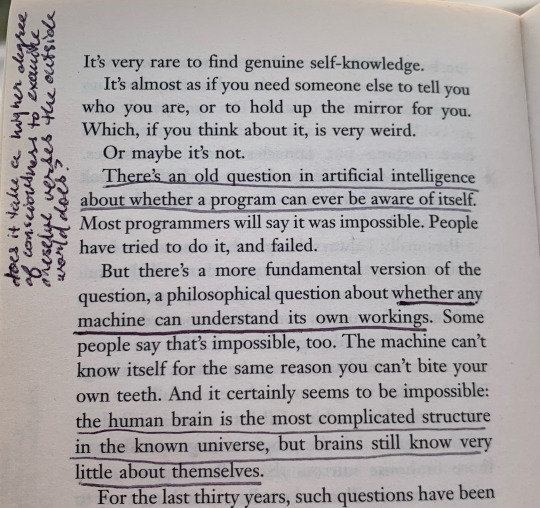
2 notes
·
View notes
Text
prendimiento de antoñito el camborio, the ethics and legality of taking fruit from trees, and racial profiling and abuse of authority as a centuries old theme….
#is there an ‘ethical’ dilemma regarding taking fruit from trees or some story or have i just read this poem too many times ???#for me ‘taking fruit from trees’ and the consequence being arrest / imprisonment / (in the poem’s case) death#is an example of a truly innocent action being twisted by those in power to oppress others#<- a literary technique to exemplify the structures of power and abuse#elle text
2 notes
·
View notes
Text
Q&A with After Dinner Conversations
I recently did an interview with After Dinner Conversation Magazine - the awesome publication that published a few of my short stories! If you're interested, please check it out!
#interview#after dinner conversation#ethics#ethical fiction#short stories#fiction#historical fiction#literary fiction#writing
1 note
·
View note
Text
Harnessing the Intensity: Fantasy Writing Lessons from Fugazi
In the diverse landscape of fantasy literature, inspiration can be drawn from a myriad of sources, including the pulsating world of music.
Fugazi, an influential post-hardcore band known for their intense sound, ethical stance, and DIY ethos, offers a unique perspective for fantasy writers.
Let’s explore what fantasy authors can learn from Fugazi’s distinct approach to music and creativity.
1.…
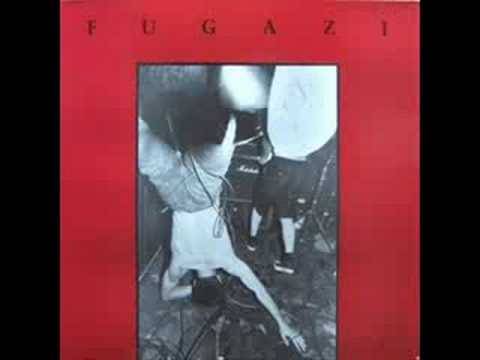
View On WordPress
#Action and Meaning#Authorial Voice#Creative Experimentation#Dynamic Storytelling#Ethical Storytelling#Fantasy Community Building#fantasy literature#Fantasy Writing Craft#Fugazi#Innovative Fantasy#Intense Storytelling#Literary Contrast#Music Inspiration#Narrative Integrity#nuanced narratives#Philosophical Fantasy#Post-Hardcore Influence#Subtlety in Fantasy#Thematic Writing
0 notes
Text
I just love cannibalism so much you know
#me :)#like ofc ofc as a literary thematic thing#but also its such a good litmus test for who will get along with me#also if it was possible to get the meat ethically would do it in literally a heartbeat. unrelated if any of you are getting limbs amputated#or anything let me know
0 notes
Text
If kircheis wasn't such a dick about it I would be more inclined to reblog certain posts of his. I'm sorry, but quantitative skills are simply more widely useful and intellectually important than literary analysis, yes even when it comes to ethics and social justice. Especially when it comes to ethics and social justice. The idea that human society can be "read like a book" and understood via the methods of literary criticism is deeply misguided and has imo done a huge amount of harm on the left. Conversely, number crunching basically has to be involved in any reasonable approach to politics or social justice and if you try to avoid it you'll end up hurting people. Like it or not, you need math to meaningfully understand the world.
268 notes
·
View notes
Text
Delving into Poetic Wisdom: A Review of "On the Art of Poetry" by Aristotle
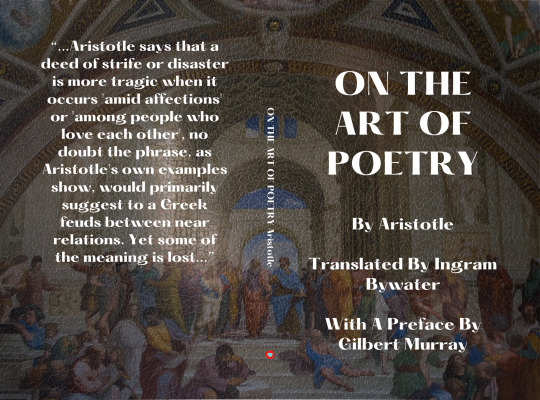
Aristotle's "On the Art of Poetry," translated by Ingram Bywater, stands as a seminal work in literary criticism, offering profound insights into the nature and function of poetry that continue to resonate with readers and scholars alike. Written in the 4th century BCE, this treatise serves as a comprehensive examination of the principles and techniques that underlie the creation of poetry, providing valuable guidance for poets and readers alike.
At its core, "On the Art of Poetry" is a testament to Aristotle's keen intellect and analytical prowess. In this work, Aristotle explores the various elements that contribute to the effectiveness of poetry, including plot, character, diction, and spectacle. Through his systematic analysis, Aristotle seeks to uncover the universal principles that govern the art of poetry, shedding light on its essential nature and its role in human society.
One of the most compelling aspects of "On the Art of Poetry" is Aristotle's emphasis on the importance of mimesis, or imitation, in poetry. According to Aristotle, poetry is a form of imitation that seeks to represent the actions, emotions, and experiences of human life. Through the skillful use of language and imagery, poets are able to create a vivid and lifelike portrayal of the world, inviting readers to engage with their work on a profound emotional and intellectual level.
Moreover, "On the Art of Poetry" offers valuable insights into the principles of dramatic structure and the role of catharsis in tragedy. Aristotle argues that tragedy is a form of poetry that evokes feelings of pity and fear in the audience, leading to a purgation or cleansing of these emotions. Through the depiction of the fall of a tragic hero, tragedy allows audiences to confront their own mortality and the fragility of human existence, ultimately leading to a deeper understanding of the human condition.
In addition to its exploration of tragedy, "On the Art of Poetry" also examines the principles of comedy and epic poetry, providing valuable guidance for poets working in these genres. Aristotle discusses the importance of unity of plot, character, and theme in epic poetry, as well as the role of humor and satire in comedy. Through his analysis, Aristotle highlights the diversity of poetic forms and the unique challenges and opportunities that each genre presents to the poet.
In conclusion, "On the Art of Poetry" by Aristotle is a timeless classic that continues to inspire and enlighten readers with its profound insights into the nature of poetry. Aristotle's systematic approach to literary criticism, coupled with his keen observations and analytical rigor, make this work an indispensable resource for anyone interested in the art of poetry. With its timeless wisdom and enduring relevance, "On the Art of Poetry" remains a cornerstone of literary theory and a testament to the enduring power of poetic expression.
Aristotle's "On the Art of Poetry," is available in Amazon in paperback 12.99$ and hardcover 18.99$ editions.
Number of pages: 116
Language: English
Rating: 10/10
Link of the book!
Review By: King's Cat
#Dramatic structure#Tragedy#Catharsis#Comedy#Epic poetry#Unity of plot#Characterization#Diction#Spectacle#Poetics#Aesthetic principles#Greek literature#Philosophical discourse#Aristotle's theory#Literary analysis#Poetic form#Emotion#Human experience#Morality#Ethics#Aesthetics#Universal principles#Literary genres#Rhetoric#Imagination
1 note
·
View note
Text
Embracing Nietzschean Philosophy: Exploring "Thus Spake Zarathustra"
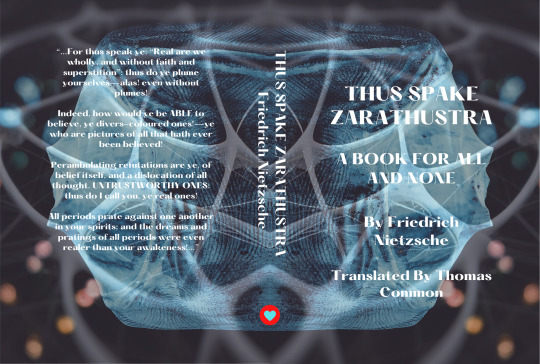
Friedrich Nietzsche's "Thus Spake Zarathustra: A Book for All and None" is a profound and provocative work that challenges conventional beliefs and invites readers to reexamine their values and assumptions about life, morality, and the human condition. Originally published in 1883, this philosophical masterpiece explores themes such as the death of God, the eternal recurrence, the will to power, and the Ubermensch (or "overman"), presenting Nietzsche's vision of a new way of thinking and living in the modern world.
At the heart of "Thus Spake Zarathustra" is the character of Zarathustra, a fictionalized version of the ancient Persian prophet Zoroaster, who descends from his mountain retreat to share his wisdom with humanity. Through a series of discourses, parables, and aphorisms, Zarathustra challenges his listeners to transcend their limitations, embrace their innermost desires, and strive for self-mastery and self-overcoming. Nietzsche's use of allegory and metaphor imbues the text with richness and depth, inviting readers to engage with its philosophical themes on multiple levels.
One of the most striking features of "Thus Spake Zarathustra" is its lyrical and poetic style, which sets it apart from Nietzsche's more academic works. Translated by Thomas Common, the text retains much of its original beauty and power, capturing Nietzsche's philosophical insights with clarity and elegance. Common's translation allows readers to immerse themselves in Nietzsche's thought-provoking ideas and experience the full force of his rhetorical flourishes and linguistic innovations.
Moreover, "Thus Spake Zarathustra" is notable for its critique of traditional morality and religion, which Nietzsche argues have stifled human potential and constrained individual freedom. Through Zarathustra's teachings, Nietzsche advocates for a radical revaluation of all values, urging readers to embrace a more expansive and life-affirming ethos that celebrates creativity, authenticity, and self-expression. Nietzsche's rejection of conventional norms and his embrace of existential freedom continue to resonate with readers today, inspiring countless individuals to question authority and forge their own path in life.
In addition to its philosophical depth and literary merit, "Thus Spake Zarathustra" has had a profound impact on art, literature, and culture, influencing thinkers such as Sigmund Freud, Carl Jung, and Friedrich Engels, as well as artists, musicians, and writers from around the world. Its themes of self-discovery, self-transcendence, and the pursuit of meaning continue to inspire and challenge readers to this day, making "Thus Spake Zarathustra" a timeless classic that speaks to the eternal quest for wisdom and self-realization.
In conclusion, "Thus Spake Zarathustra: A Book for All and None" by Friedrich Nietzsche, translated by Thomas Common, is a thought-provoking and intellectually stimulating work that continues to captivate readers with its profound insights, poetic language, and revolutionary ideas. Nietzsche's vision of the Ubermensch and his call to embrace the fullness of life remain as relevant today as they were when the book was first published, offering a powerful antidote to the nihilism and despair of the modern age.
Friedrich Nietzsche's "Thus Spake Zarathustra: A Book for All and None" is available in Amazon in paperback 23.99$ and hardcover 29.99$ editions.
Number of pages: 471
Language: English
Rating: 11/10
Link of the book!
Review By: King's Cat
#Thus Spake Zarathustra#Friedrich Nietzsche#Philosophy#Existentialism#Ubermensch#Overman#Will to power#Nihilism#Death of God#Eternal recurrence#Morality#Individualism#Self-overcoming#Self-mastery#Transcendence#Human condition#Spiritual liberation#Life affirmation#Existential freedom#Philosophy of life#Ethics#Individual autonomy#Nietzschean philosophy#Self-discovery#Self-realization#Human potential#Radical revaluation#Authenticity#Self-expression#Literary classic
1 note
·
View note